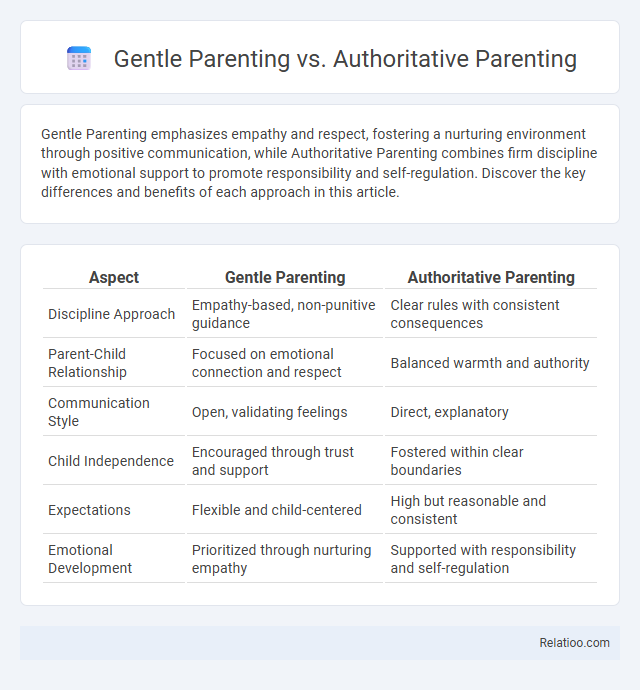Gentle Parenting emphasizes empathy and respect, fostering a nurturing environment through positive communication, while Authoritative Parenting combines firm discipline with emotional support to promote responsibility and self-regulation. Discover the key differences and benefits of each approach in this article.
Table of Comparison
| Aspect | Gentle Parenting | Authoritative Parenting |
|---|---|---|
| Discipline Approach | Empathy-based, non-punitive guidance | Clear rules with consistent consequences |
| Parent-Child Relationship | Focused on emotional connection and respect | Balanced warmth and authority |
| Communication Style | Open, validating feelings | Direct, explanatory |
| Child Independence | Encouraged through trust and support | Fostered within clear boundaries |
| Expectations | Flexible and child-centered | High but reasonable and consistent |
| Emotional Development | Prioritized through nurturing empathy | Supported with responsibility and self-regulation |
Understanding Gentle Parenting: Core Principles
Gentle parenting centers on empathy, respect, and nurturing a child's emotional development by prioritizing connection over punishment. This approach contrasts with authoritative parenting, which balances firm boundaries with responsiveness, and inclusive parenting that emphasizes diversity and acceptance within family dynamics. Key principles of gentle parenting include active listening, validating feelings, and guiding behavior through positive reinforcement and cooperation.
The Foundations of Authoritative Parenting
Authoritative parenting is grounded in a balanced approach that combines clear, consistent expectations with emotional responsiveness and support, fostering independence and self-regulation in children. This style emphasizes open communication, mutual respect, and setting age-appropriate boundaries, which contribute to positive developmental outcomes, such as higher academic achievement and social competence. Unlike gentle parenting's focus on empathy or inclusive parenting's emphasis on diversity and acceptance, authoritative parenting integrates structure with warmth to build resilience and emotional intelligence.
Key Differences Between Gentle and Authoritative Approaches
Gentle parenting emphasizes empathy, respect, and nurturing emotional connections, promoting a calm and supportive environment for your child's development. Authoritative parenting balances warmth and firmness, setting clear boundaries while encouraging independence and reasoning skills. The key difference lies in gentle parenting's focus on emotional attunement versus authoritative parenting's structured discipline combined with responsiveness.
Communication Styles in Each Parenting Method
Gentle parenting emphasizes empathetic and respectful communication, encouraging open dialogue that validates Your child's emotions and fosters trust. Authoritative parenting combines clear, consistent expectations with supportive communication, balancing firmness with warmth to guide behavior effectively. Inclusive parenting promotes active listening and collaborative problem-solving, ensuring that every family member's voice is acknowledged and valued in decision-making processes.
Discipline Techniques: Gentle vs Authoritative Parenting
Gentle parenting emphasizes empathetic communication and positive reinforcement to guide Your child's behavior, fostering trust and emotional security. Authoritative parenting combines firm boundaries with responsive support, using clear rules and consistent consequences to promote accountability and self-discipline. Inclusive parenting integrates diverse cultural and individual needs, adapting discipline techniques to respect and empower every child's unique identity.
Emotional Development and Parent-Child Bonds
Gentle Parenting fosters your child's emotional development by emphasizing empathy, active listening, and validation of feelings, which strengthens the parent-child bond through trust and security. Authoritative Parenting balances clear boundaries with emotional responsiveness, promoting self-regulation and resilience while maintaining respectful and supportive connections. Inclusive parenting embraces diversity and individual differences, encouraging emotional awareness and acceptance that nurture strong, adaptable relationships within diverse family dynamics.
Effects on Child Behavior and Social Skills
Gentle Parenting emphasizes empathy and respect, fostering emotional security that enhances a child's social competence and reduces aggressive behavior. Authoritative Parenting combines clear boundaries with warmth, promoting self-discipline, social responsibility, and positive peer relationships. Inclusive Parenting integrates diverse perspectives, encouraging acceptance and collaboration, which develops Your child's adaptability and strong interpersonal skills in multicultural environments.
Long-Term Outcomes: Academic and Psychological Impact
Gentle Parenting promotes emotional security and self-regulation, often leading to higher academic motivation and lower anxiety in children. Authoritative Parenting, characterized by high responsiveness and clear boundaries, is linked to strong academic achievement, social competence, and psychological resilience. Inclusive Parenting, emphasizing acceptance and diversity, fosters open-mindedness, empathy, and improved mental health, with positive effects on long-term cognitive flexibility and academic engagement.
Challenges and Common Misconceptions
Gentle parenting often faces challenges such as being perceived as permissive or lacking discipline, while authoritative parenting struggles with balancing firm rules and emotional support, leading to misconceptions about being too strict or overly controlling. Inclusive parenting encounters difficulties in addressing diverse family dynamics and cultural differences, often misunderstood as diluting parental authority or consistency. Understanding these nuances helps you apply the most effective strategies tailored to your child's unique needs and family environment.
Choosing the Right Approach for Your Family
Choosing the right parenting approach depends on your family's unique values and dynamics, balancing gentle parenting's emphasis on empathy and respect with authoritative parenting's structure and clear boundaries. Inclusive parenting integrates diverse cultural perspectives and promotes acceptance, fostering a supportive environment for all family members. Tailoring your approach ensures children's emotional development and behavior align with your family's needs and long-term goals.

Infographic: Gentle Parenting vs Authoritative Parenting
 relatioo.com
relatioo.com